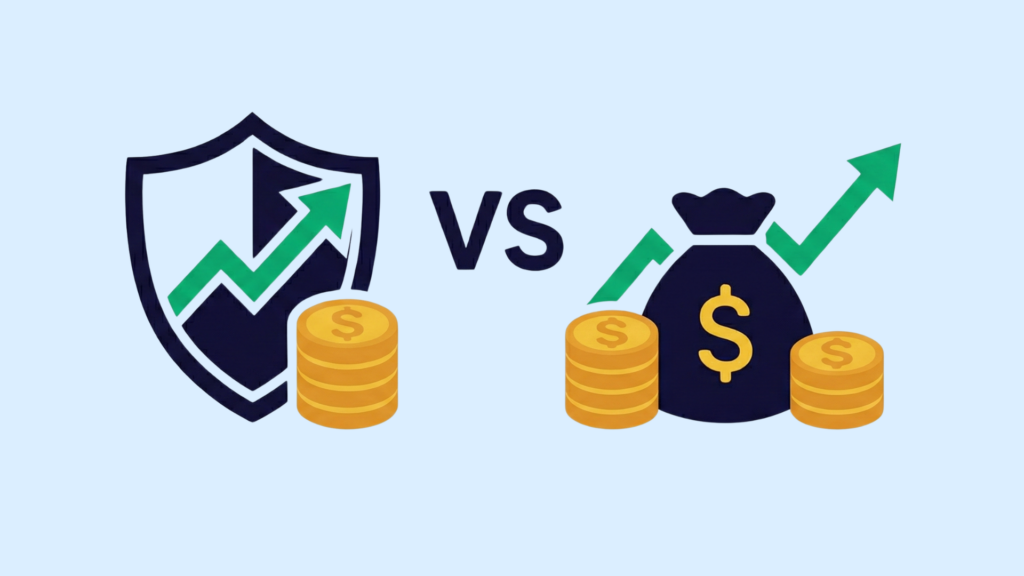Quick Summary:
– Mutual funds provide tax benefits, including tax deductions under Section 80C for investing in ELSS.
– You are taxed at 12.5% on long-term capital gains (over ₹1.25 lakh) for equity mutual funds and 20% on short-term gains.
– After April 2023, debt mutual funds are taxed as short-term gains at your income tax slab rate.
– Among all savings options, ELSS is the most efficient because you save tax as well as earn market returns.
– SIP in ELSS allows you to save tax throughout the year, and lock in your tax savings for 3 years.
Mutual funds are known for offering both growth potential and tax advantages. However, the tax benefits depend on the type of fund you choose and how long you stay invested. From ELSS schemes offering Section 80C deductions to the tax efficiency of long-term capital gains, there are multiple ways to align your investments with tax-saving goals.
In this blog, we will break down the key mutual fund tax benefits and guide you on making the most of them. Keep reading!
Tax-Free Mutual Funds: Myth or Reality?
The term “tax-free” in mutual funds is often misunderstood. Mutual funds are not completely exempt from taxes. However, certain conditions and schemes can help you lower or even eliminate your tax burden. For example, long-term capital gains (LTCG) up to ₹1.25 lakh per financial year from equity mutual funds are tax-exempt.
Similarly, if your total income (including capital gains) is below the basic exemption limit, you are not required to pay any tax on those gains. Additionally, some transactions, like gifts or transfers through an irrevocable trust, are not considered taxable events under the Income Tax Act.
Mutual Fund Tax Exemption Under the Income Tax Act
Section 80C of the Income Tax Act allows you to get deductions up to ₹1.5 lakh per financial year for certain specified investments, and ELSS mutual funds fall under this category. Equity-linked savings scheme (ELSS) is one of the most efficient tax-saving options. They offer twofold benefits:
- Tax Deduction: Investment amount qualifies for deduction under Section 80C.
- Potential Market-Linked Returns: Since ELSS invests largely in equities, it can offer higher returns than traditional tax-saving options like fixed deposits or PPF.
Even though the invested amount gets the deduction, the maturity proceeds are taxable if gains exceed ₹1.25 lakh. Yet, ELSS remains one of the most efficient tax-saving and wealth-creating options for investors.
Tax Implications on Different Types of Mutual Funds
The tax treatment of mutual funds mainly depends on the type of fund—equity or debt—and your holding period.
Taxation on Equity Mutual Funds
Equity mutual funds are those where at least 65% of the portfolio is invested in equity (shares).
- If you sell your fund units within 12 months, you incur Short-Term Capital Gains (STCG), taxed at 20% after 23rd July 2024 (earlier 15%).
- If you hold the units for more than 12 months, gains above ₹1.25 lakh are taxed at 12.5% without indexation benefit.
- Gains up to ₹1.25 lakh in a fiscal year are tax-free.
A Securities Transaction Tax (STT) of 0.001% is levied when selling equity mutual fund units.
Taxation on Debt Mutual Funds
These mutual funds put your funds in debt instruments like government bonds, corporate bonds, and treasury bills.
- If purchased after 31 March 2023, gains from debt funds are always treated as short-term, irrespective of the holding period. They are taxed as per your income tax slab.
- For units purchased before 1 April 2023:
- Gains from units held for less than 3 years are taxed as STCG at your income slab rate.
- Gains from units held for more than 3 years were earlier eligible for 20% tax with indexation. (Now, the indexation benefit is removed.)
Debt fund redemptions are not subject to STT.
Holding Period and Capital Gains Tax
The holding period plays an important role in determining whether your gains are short-term or long-term:
- Equity Funds: Short-term if held for less than 12 months; long-term if held for 12 months or more.
- Debt Funds: Always considered short-term if purchased after April 1, 2023.
- Hybrid Funds: Depends on equity exposure:
- Equity exposure is taxed like equity funds if it is more than 65%.
- If less than 65%, taxed like debt funds.
Important: Dividends from mutual funds are added to your total income and taxed according to your income tax slab. Additionally, if dividend income exceeds ₹5,000 in a year, 10% TDS (Tax Deducted at Source) is deducted.
Long-Term vs. Short-Term Capital Gains
When you sell mutual fund units, your gains are classified based on how long you held the investment. The holding period determines whether the gain is short-term (STCG) or long-term (LTCG), and different tax rates apply to each. Here’s a detailed breakdown:
| Type of Mutual Fund | Holding Period for STCG | Holding Period for LTCG | Tax Rate on STCG | Tax Rate on LTCG | Indexation Benefit |
| Equity Mutual Funds | Less than 12 months | More than 12 months | 20% (post 23 July 2024) | 12.5% on gains above ₹1.25 lakh | No |
| Debt Mutual Funds (purchased after 1 April 2023) | Any holding period | Not applicable | Taxed as per the income tax slab | Not applicable | No |
| Debt Mutual Funds (purchased before 1 April 2023) | Less than 3 years | More than 3 years | Taxed as per the income tax slab | 20% with indexation | Yes (only for older investments) |
Key Points to Remember:
- Equity mutual funds enjoy concessional tax rates and some exemption on long-term gains (up to ₹1.25 lakh).
- Debt mutual funds lose indexation benefits if purchased after 1 April 2023.
- Short-term gains are generally taxed at a higher rate compared to long-term gains.
- Indexation adjusts the purchase cost for inflation, but now applies only to old debt fund investments.
How to Maximise Mutual Fund Tax Benefits
If you invest smartly, mutual funds can help you grow your money and save tax at the same time. Here are practical strategies you can follow to make the most of tax benefits:
1. Invest in ELSS for Section 80C Deductions
Equity-linked savings schemes are mutual funds that qualify for tax deductions under Section 80C of the Income Tax Act. Investing in ELSS can claim a deduction of up to ₹1.5 lakh in a financial year. These funds come with a mandatory 3-year lock-in period, the shortest among all tax-saving investment options.
2. Combine SIP with ELSS for Tax Efficiency
Instead of investing a lump sum in ELSS at the end of the financial year, set up a Systematic Investment Plan (SIP) throughout the year. This way, you spread your investments, lower market timing risk, and qualify for regular Section 80C deductions without a last-minute rush.
3. Plan Redemptions Based on Holding Period
To benefit from lower tax rates, plan to hold your mutual fund investments beyond the long-term holding period (12 months for equity funds and 36 months for older debt funds). This way, your gains are taxed at a lower rate, and in the case of equity funds, long-term gains up to ₹1.25 lakh are tax-free.
4. Use Capital Gains Exemptions Wisely
If your total income (including capital gains) falls below the basic exemption limit (₹2.5 lakh under the old regime or ₹4 lakh under the new regime from FY 2025-26), you may not have to pay tax on your mutual fund gains. Track your overall income carefully to avoid unnecessary tax payments.
5. Reinvest Capital Gains for Additional Exemptions
If you have large long-term capital gains from non-equity mutual funds, you can explore reinvestment options under Sections like 54EC (investment in specified bonds) to save tax, though this strategy is more common for real estate gains.
Conclusion
Mutual funds offer valuable tax benefits, especially through schemes like ELSS under Section 80C and partial exemptions on long-term capital gains. While not all returns are fully tax-free, strategic investments can significantly lower your tax burden and support long-term wealth creation.
Combining smart fund selection with disciplined tax planning makes mutual funds a powerful tool for building financial security and achieving your investment goals.
FAQs
Which mutual funds are eligible for tax exemption under Section 80C?
Only Equity Linked Savings Schemes (ELSS) are eligible for tax exemption under Section 80C of the Income Tax Act. You can claim a deduction of up to ₹1.5 lakh in a financial year by investing in ELSS funds. However, the investment comes with a mandatory lock-in period of 3 years.
Are returns from mutual funds completely tax-free?
No, returns from mutual funds are not completely tax-free. While certain benefits are available (like LTCG exemptions up to ₹1.25 lakh per year for equity funds), any gains above the exemption limit are taxed. Also, dividends from mutual funds are added to your total income and taxed at your applicable income tax slab rate.
What is the tax benefit of investing in ELSS mutual funds?
When you put money in an ELSS mutual fund, you can get deductions of up to ₹1.5 lakh per year under Section 80C. Apart from the tax deduction on investment, ELSS funds also offer the potential for equity-linked returns. However, gains above ₹1.25 lakh after the 3-year lock-in are taxed 12.5% without indexation.
How is capital gains tax calculated on mutual fund investments?
Capital gains tax on mutual funds is based on the type of fund (equity or debt) and the holding period.
- For equity mutual funds, gains held for more than 12 months are taxed as Long-Term Capital Gains (LTCG) at 12.5% beyond ₹1.25 lakh; gains within 12 months are Short-Term Capital Gains (STCG) taxed at 20%.
- For debt mutual funds, gains are added to your income and taxed as per your slab rate, regardless of the holding period if purchased after April 1, 2023.
Can SIP investments in mutual funds also provide tax benefits?
SIP (Systematic Investment Plan) investments in ELSS funds qualify for tax advantages under Section 80C. Each SIP instalment is treated as a fresh investment and comes with a 3-year lock-in period if invested in ELSS. SIPs in non-ELSS mutual funds do not offer tax deductions but may still be more tax-efficient when held for the long term.
Disclaimer: Investments in securities markets are subject to market risks. Read all the related documents carefully before investing. The securities quoted are exemplary and are not recommended.























